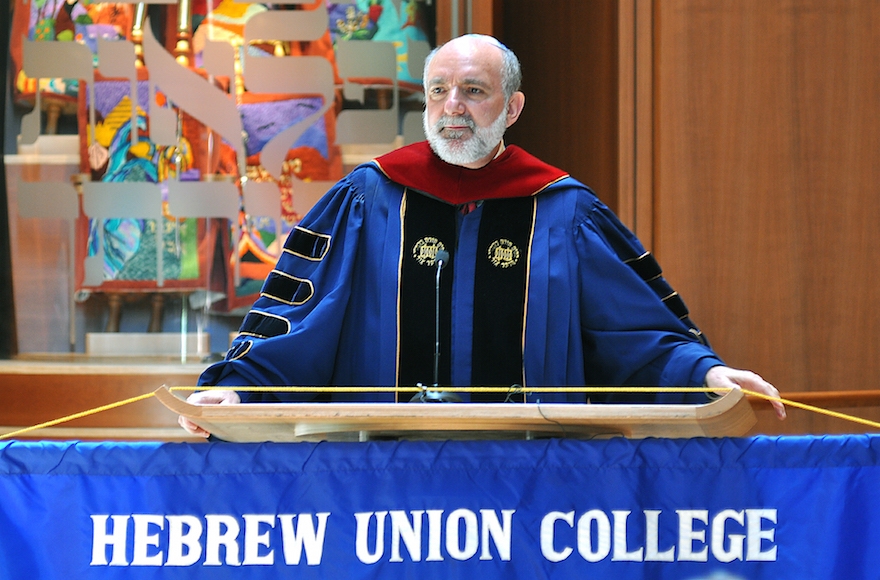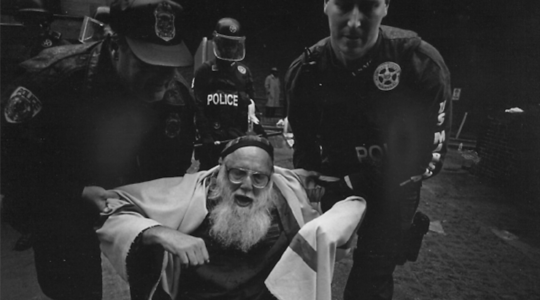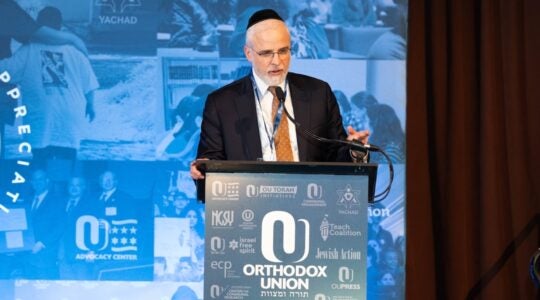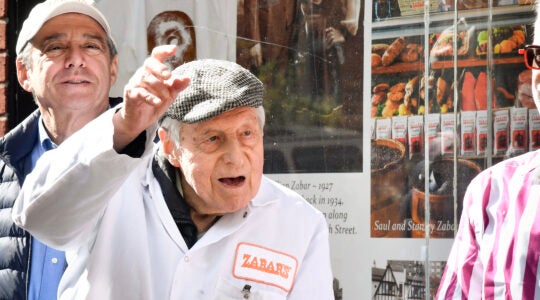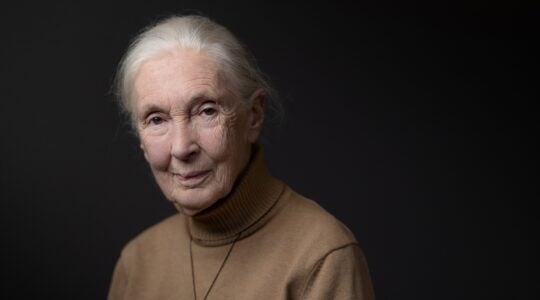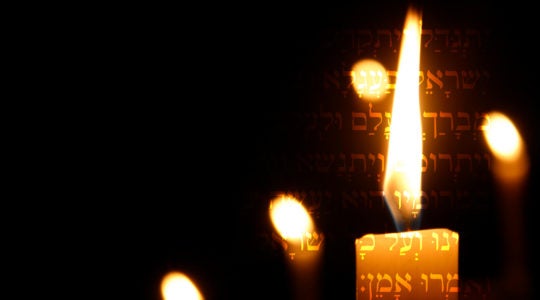(JTA) — Rabbi David Ellenson, who served for 12 years as president of Hebrew Union College-Jewish Institute of Religion and mentored a generation of rabbis and scholars as a historian, adviser and confidant, died Thursday morning at his home in Manhattan. He was 76.
The cause was a heart ailment, according to a spokesperson for the Reform movement flagship.
A renowned scholar in his own right — whose interests ranged from the origins and development of Orthodox Judaism in Germany to the relationship between religion and state in Israel — he was known and admired among such a wide circle of colleagues and students that the New York Jewish Week tagged him “everyone’s favorite rabbi” when he stepped down as president of HUC-JIR in 2013.
“It is impossible to overstate David’s importance to the Jewish People, Reform Judaism and to Hebrew Union College-Jewish Institute of Religion in particular,” Andrew Rehfeld, the current president of HUC-JIR, said in a statement. “His scholarship and depth of knowledge were world-renowned, and his humility, warmth, generosity of spirit, and deep concern for each individual inspired all of us who had the privilege to know him. I feel blessed to have had him as a friend and mentor and will miss him dearly.”
A raft of tributes flowed in upon news of Ellenson’s passing, which came as a shock even to those who knew him well. He had attended an event celebrating another rabbi just the day before his death.
“He was one of the kindest people I ever knew,” wrote Yehuda Kurtzer, president of the Shalom Hartman Institute, where Ellenson taught rabbis in its summer programs and recently joined its research center in New York as a senior fellow. “This is no small thing in general but is downright extraordinary for a person whose life was in leadership and lived in public.”
Rabbi Rachael Klein Miller, associate rabbi of Temple Emanu-El in Atlanta, wrote that she came into the rabbinate inspired by Ellenson’s writings in Jewish ethics, although “through my time at HUC I was much more inspired by the genuine kindness and engaging teachings of this Reform Movement giant.”
Even rabbis who weren’t ordained at HUC or didn’t know him well wrote of his influence and example. Rabbi Tali Adler, who is on the faculty of New York’s Hadar Institute, said she had never met Ellenson but that over the summer he had taken a few of her classes online and sent her a handwritten note thanking her. “There was no reason he had to take his time to find out how to reach me and write to me personally,” she wrote. “No reason but the exceptional kindness and love of Torah that everyone who speaks and writes about him knew so well.”
As president of HUC-JIR, Ellenson made a year of study in Israel for rabbinical students a priority, even during the violent second intifada. He also shepherded the institution — which has campuses in Cincinnati, Los Angeles, New York and Jerusalem— during the financial crisis of 2008 and ’09. In 2009 HUC-JIR considered closing two of its three U.S. campuses but staved off such moves until 2022, when its board of governors decided to close the residential rabbinic program in Cincinnati and enroll all rabbinical students at HUC’s campuses in New York and Los Angeles.
Under Ellenson’s stewardship, HUC-JIR expanded the role of women on its board of governors and regional boards of advisors, according to the school. During his tenure, HUC-JIR expanded professional leadership through a variety of fellowships, and introduced new distance learning initiatives.
He also led efforts among Reform and Conservative Jewish leaders to ease the Israeli Orthodox rabbinate’s grip on religious ritual in Israel and expand acceptance and funding for non-Orthodox movements there.
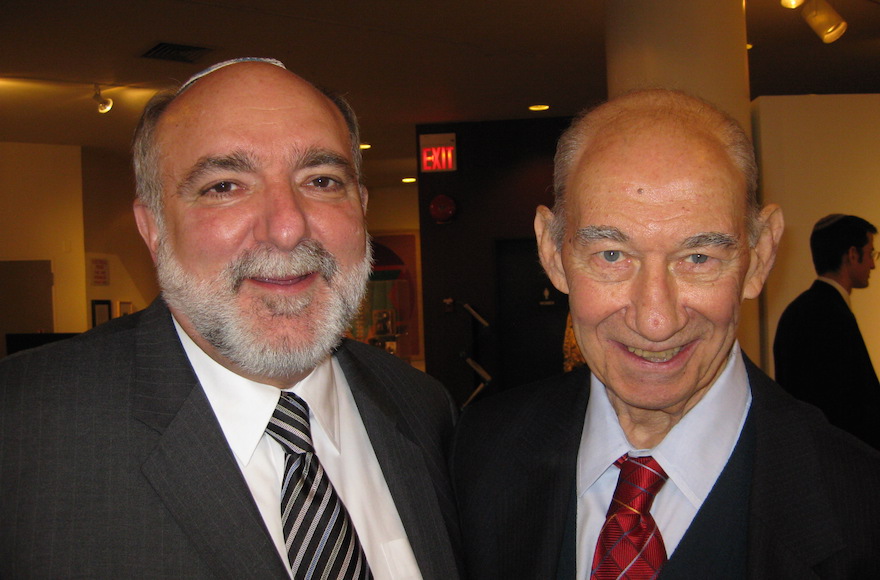
Rabbis David Ellenson, left, and Eugene Borowitz, the influential Reform theologian, in 2009, on the occasion of the latter’s 85th birthday. (Courtesy of Hebrew Union College-Jewish Institute of Religion)
In 2018 he returned as interim president after his successor, Rabbi Aaron Panken, died in a plane crash. At the time, Ellenson had just concluded a tenure as director of the Schusterman Center for Israel Studies at Brandeis University, a position he held starting in 2015. At Brandeis he also served as a visiting professor in the Department of Near Eastern and Judaic Studies.
Rehfeld was appointed president in 2019, and Ellenson became chancellor-emeritus.
David Ellenson was born in 1947 and grew up in an Orthodox family in Newport News, Virginia. At a tribute dinner in 2014, Skip Vichness, a lifelong friend and former board chair of the Foundation for Jewish Camp, recalled growing up a few blocks away from Ellenson and how the two skinny kids played for the local JCC basketball team. When the team won the local championship, said Vichness, the headline in the southern town’s daily newspaper read: “Upset Of The Year: Jews Win.”
Growing up in the small community, Ellenson recalled in a podcast interview in 2018, he observed “the tensions between what I would call a commitment to Jewish tradition and Jewish identity on the one hand, and a desire to participate fully in the larger world on the other.” He came to the conclusion that Reform Judaism, which does not accept that Torah is the literal word of God, appealed to him as “an ongoing narrative where each generation of Jews writes a different story in which they attempt to capture what it is they feel that God commands in their age.”
Ellenson received a bachelor’s degree at the College of William and Mary in 1969 and a master’s degree in religious studies at the University of Virginia in 1972.
He received his Ph.D. in 1981 from Columbia University, where the eminent Israeli historian Jacob Katz guided him to the study of modern responsa — rabbinic opinions that applied Jewish law to changing social conditions. Having embraced the liberal Reform movement, and after undertaking an unusually intense program of study, he was ordained as a rabbi by HUC-JIR in 1977.
Prior to his appointment as president in 2001, he spent some 30 years at HUC-JIR as a student and faculty member.
“My soul is bound to this institution and to the holy mission that animates it,” he wrote in 2013. “It has been the greatest privilege to devote my life to this school.”
In decades of scholarship, Ellenson invariably focused on the conflicts and possibilities for reconciliation “Between Jewish Tradition and Modernity,” the title of a book of essays collected in his honor in 2014.
One of the most enduring questions he posed in his scholarship, wrote David N. Meyers in his introduction to the volume, was “whether to err on the side of leniency in order to allow for a larger and more inclusive Jewish community or to hold fast to established exclusionary norms.”
In 2011, in an interview he gave soon after becoming HUC’s president, he spoke about applying his scholarly interests to the challenges of reaching Jews on the “fringes” of Jewish life.
“The challenge of our age — at least in America — is that Jews are accepted to such a degree that, unless we respond with compelling initiatives, Jews will disappear in even larger numbers in what is, after all, a voluntaristic society in which we are highly acculturated and overwhelmingly accepted,” he said.
For two decades, Ellenson served as head of the Louchheim School of Judaic Studies at the University of Southern California under the aegis of HUC-JIR. He also served as a visiting professor at both UCLA and the Jewish Theological Seminary of America, the Conservative movement flagship.
In 2015, New York University appointed him as distinguished visiting professor in the Skirball Department of Judaic Studies.
Ellenson wrote or edited seven books and over 300 articles and reviews. His book, “After Emancipation: Jewish Religious Responses to Modernity,” won the National Jewish Book Award in Jewish Thought in 2005. “Rabbi Esriel Hildesheimer and the Creation of a Modern Jewish Orthodoxy (1990) and “Pledges of Jewish Allegiance: Conversion, Law, and Policymaking in Nineteenth- and Twentieth-Century Orthodox Responsa” (2012) were nominated for book awards by the Jewish Book Council.
His funeral will be held at 11 a.m., Sunday, Dec. 10, at Congregation Rodeph Sholom in New York. It will be streamed lived via their website.
Ellenson is survived by his wife, Rabbi Jacqueline Koch Ellenson; his children Ruth Andrew Ellenson, Rabbi Micah Ellenson, Nomi Ellenson May, Rafi Ellenson, a Hebrew College rabbinical student, and Hannah Miriam Ellenson, a rabbinical student at HUC; and four grandchildren.
He is also survived by the countless friends he attracted and nurtured, a hallmark of his leadership.
JTA has documented Jewish history in real-time for over a century. Keep our journalism strong by joining us in supporting independent, award-winning reporting.
